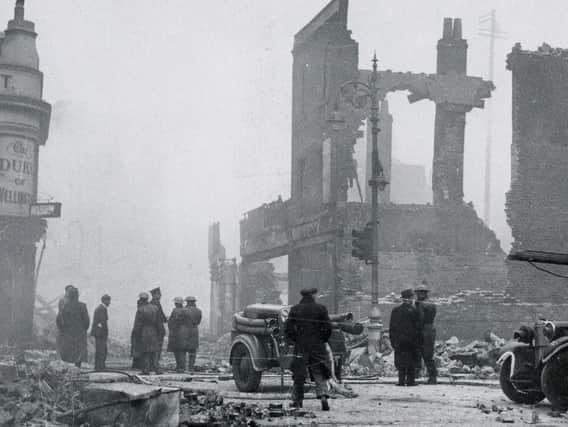Portsmouth pensioner recalls city's worst ever bombing blitz in the Second World WarÂ


It was the city's most catastrophic loss during World War Two with witnesses describing a '˜blood red glow' which illuminated the Isle of Wight and could be seen from the French coastline.
During the brutal attack the city also saw the Guildhall reduced to a smouldering shell, lost six of its churches and saw its three major shopping centres in Kings Road, Palmerston Road and Commercial Road destroyed.
Advertisement
Hide AdAdvertisement
Hide AdIt was the first raid on the city with Portsmouth feeling the full force of the Nazi onslaught with an estimated 25,000 incendiaries and 300 bombers wreaking devastation across the city. After the first two hour raid, which started at around 7 pm, the Luftwaffe returned at 11 pm to inflict further misery on the decimated city.
After this initial raid, Portsmouth became a key Nazi target due to the presence of the historic naval base and the city's key role in manufacturing warships.Â
Patricia Rowland, now 90, was a 12-year-old school girl at the time. Seventy-eight years on she recalls that fateful night.
Â
'˜It all started early that evening when we heard the high pitched shrill noise of the air raid siren. My father kept chickens and so was out in the garden when the siren sounded. I remember him shouting into the house that he could hear the Luftwaffe flying overhead. We didn't have an air raid shelter as dad liked to use the garden for his vegetable patch and so we all hid under the stairs,' explained Patricia.
Advertisement
Hide AdAdvertisement
Hide AdIt was in this cramped stairwell that Patricia, her parents and four siblings all took refuge as the carnage unfolded across the city.
'˜It was terrifying,' said Patricia. '˜There was the chilling drone of the bombers overhead which would be intermittently followed by the deafening sound of explosions. You could hear the noise of the bombs hurtling towards the ground but didn't know where they would strike. The closer the noise the more frightened I felt,' she added.
After the initial barrage of destruction, an eerie silence fell across the city.
'˜Eventually we ventured outside. There was an orange glow across the city's skyline and and you could see the fire from the Guildhall lighting up the sky,' said Patricia.
Advertisement
Hide AdAdvertisement
Hide AdWhilst Patricia and her fellow residents in Rosetta Road in Milton were left unscathed by the attack, not all neighbourhoods were so fortunate.
'˜Going to school later that week you were literally scrambling across the rubble. In particular I remember numbers eight to 12 on Dunbar Road having been razed to the ground,' recalled Patricia.Â
Although the scale of devastation from that night was never repeated it was the beginning of a targeted campaign against the city.
'˜I remember on one occasion the siren went off when we were at school. As we hid under the desks there was a massive explosion nearby which cause all the windows to shatter into the classroom,' said Patricia. Â
'˜At one point the bombings became almost routine with attacks taking place at least two nights a week. At the time we just learned to live with it.'
  Â
Â